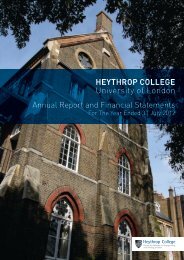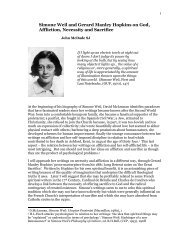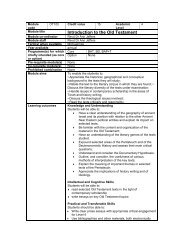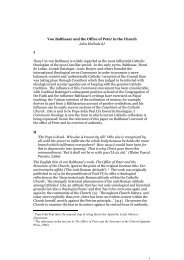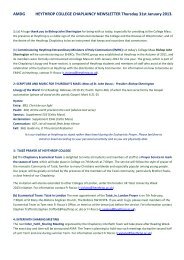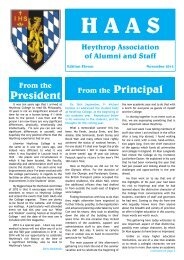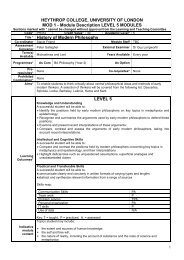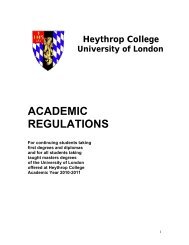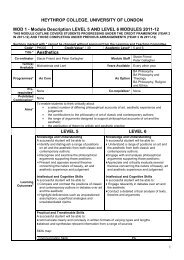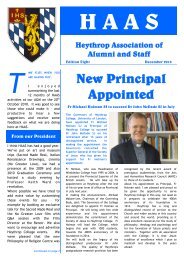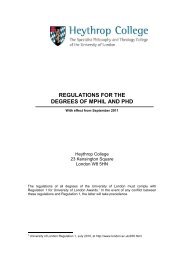Wallace_Stevens.pdf - Heythrop College
Wallace_Stevens.pdf - Heythrop College
Wallace_Stevens.pdf - Heythrop College
You also want an ePaper? Increase the reach of your titles
YUMPU automatically turns print PDFs into web optimized ePapers that Google loves.
16<br />
Clearly, I am proposing here a very religious reading of the themes of reality and vision which<br />
pervade <strong>Stevens</strong>’ poetic vocabulary. Later I will argue that by reducing God to one of the fictive<br />
imaginings that delight us rather than as the necessary foundation of a reality in which we can<br />
delight imaginatively, <strong>Stevens</strong>’ aesthetic is weakened. Another, to my mind, contradictory<br />
possibility which receives more attention from him than it should concerns the question of<br />
whether we can be said to believe in what is untrue. In a letter, he entertains<br />
the idea that, in the various predicaments of belief, it might be possible to yield, or to try<br />
to yield, ourselves to a declared fiction… the same thing as saying that it might be possible<br />
for us to believe in something that we know to be untrue. 47<br />
You can believe in something if you think it is real and true: that was the strength of religion –<br />
and still is, I hope, unless we succumb to a non-realist version of God-talk as found in Don<br />
Cupitt’s ‘Sea of Faith’ movement. But can you really be said to ‘believe’ in a declared fiction, as<br />
distinct from ‘entertaining’ such a fiction If you know that what you might believe in is fictive,<br />
the product of the imagination, how can you credit it Belief in God is surely inseparable from a<br />
fundamental trust in relation to the world and ourselves. Can you put your credence in a lie, even<br />
a lie that gives you pleasure, ‘as if’ it were true 48 <strong>Stevens</strong> records a conversation with a student<br />
one evening as they walked home:<br />
I said that I thought we had reached a point at which we could no longer really believe in<br />
anything unless we recognized that it was a fiction. The student said that that was an<br />
impossibility, that there was no such thing as believing in something that one knew was<br />
not true. It is obvious, however, that we are doing that all the time. There are things with<br />
respect to which we willingly suspend disbelief; if there is instinctive in us a will to<br />
believe, whether or not it is instinctive, it seems to me that we can suspend disbelief with<br />
reference to a fiction as easily as we can suspend it with reference to anything else. There<br />
are fictions that are extensions of reality. There are plenty of people who believe in<br />
Heaven as definitely as your New England ancestors and my Dutch ancestors believed in<br />
it. But Heaven is an extension of reality. 49<br />
<strong>Stevens</strong>’ opening sentence says we are now able to believe only in what we construct through<br />
imagination, what he calls ‘fiction’. His assumption, of course, is that our reflective grasp of all<br />
our instruments of understanding, including religion and art, recognises that everything to which<br />
we give our trust, our faith, our credence, is devised by us. We are now sophisticated enough,<br />
suggests <strong>Stevens</strong>, not to be frightened by our critical ‘coming of age’ and can now believe while<br />
knowing that what we believe depends on our creativity: truth, even when it is discovered, is<br />
framed by the categories which the mind brings to the world.<br />
That what Nietzsche calls ‘the mobile army of metaphors’ not only indelibly infects the narratives<br />
of belief, but even generates these narratives in the first place seems to have been <strong>Stevens</strong>’ view.<br />
47 L, 443<br />
48 We know that <strong>Stevens</strong> had read Freud’s The Future of an Illusion carefully in 1928 and 1929. In<br />
it, Freud discusses the philosophy of ‘As if’ in relation to Hans Vaihinger: ‘The [‘As if’ philosophy]<br />
asserts that our thought-activity includes a great number of hypotheses whose groundlessness<br />
and even absurdity we fully realize. They are called ‘fictions,’ but for a variety of practical reasons<br />
we have to behave ‘as if’ we believed in these fictions. This is the case with religious doctrines<br />
because of their incomparable importance for the maintenance of human society… I am reminded<br />
of one of my children who was distinguished at an early age by peculiarly marked matter-offactedness.<br />
When the children were being told a fairy story and were listening to it with rapt<br />
attention, he would come up and ask, ‘Is that a true story’ When he was told it was not, he would<br />
turn away with a look of disdain. We may expect that people will soon behave in the same way<br />
toward fairy tales of religion, in spite of the advocacy of “As if”.’ Richardson, op.cit., 58-62;<br />
quotation 58-9. Cf. <strong>Stevens</strong> on Freud in ‘The Noble Rider and the Sounds of Words’, CP, 651.<br />
49 L, 430. The ‘will to believe’ is from William James.



